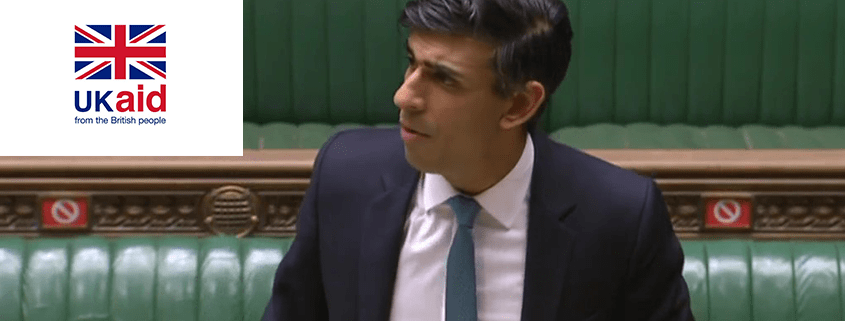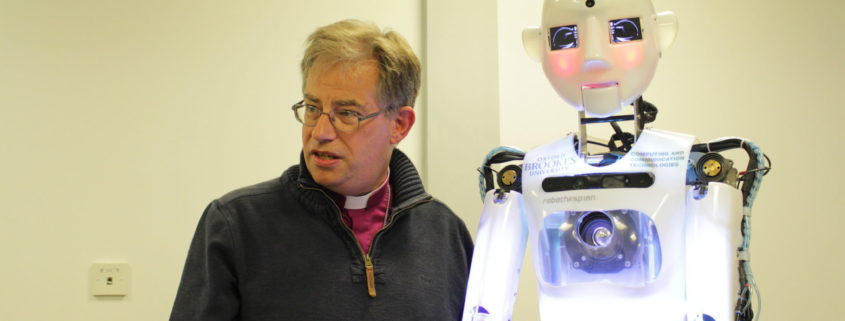Bishop Steven urges the government to consider implementing a Code of Practice for both Hate Crime and wider legal harms.
Posts
A response to overseas aid cuts
An open letter to MPs within the Diocese of Oxford
On Wednesday November 25th, Chancellor Rishi Sunak announced a temporary cut to Britain’s foreign aid budget, reducing spending in the coming year to 0.5% of national income. The Rt Revd Dr Steven Croft, Bishop of Oxford, has written to MPs within the Diocese of Oxford.
Following the Chancellor’s announcement in today’s Spending Review of a ‘temporary’ reduction in the international development budget, I am writing to all Members of Parliament representing the three counties of Oxfordshire, Berkshire and Buckinghamshire which make up the Diocese of Oxford. I write out of deep concern for the devastating impacts that this change will mean.
This action undermines reassurances given previously by Ministers on the floor of the House of Lords to honour the 0.7% of GDP commitment. There is no assurance of when 0.7% will be restored. While I fully acknowledge the scale and complexity of the challenges the government now faces, we remain one of the richest countries in the world. Britain benefits from infrastructural and economic resilience that too many of the world’s poorest countries and communities lack. Cutting our development spending will heap a disproportionate extra load onto nations already overburdened by debt, poverty, and other developmental challenges. The World Bank estimates that up to 150 million people now risk falling into extreme poverty through the effects of the pandemic effectively wiping out all of the development gains of the last 20 years.
The Government’s 0.7% commitment to foreign aid, enshrined in law, is both a tangible and a symbolic demonstration of the values underpinning Britain’s global aspiration to use her wealth and her soft power as a force for good in the world.
As Archbishop Desmond Tutu says, a promise to the poor is particularly sacred. I hope and pray that the independent voices and judgement of Members of Parliament will prevail and that this intention can yet be amended and avoided.
This letter comes with my best wishes and the assurance of the prayers of the Diocese for you in your hugely demanding role.
The Bishop of Oxford, the Rt Revd Steven Croft, spoke in a debate in the House of Lords this afternoon about protecting and representing the interests of future generations in policy making. Bishop Steven spoke on climate chaos, the rise of artificial intelligence and the impact of both on young people’s mental health.
Join Bishop Steven at the Mass Lobby of MPs on 26 June. Full details here: https://www.theclimatecoalition.org/thetimeisnow
“My Lords, I warmly welcome this debate and want to express my appreciation to Lord Bird for his intiative and his proposals. Lord Bird has set out very well the case for a Select Committee and for a Future Generations Commissioner.
The moral case has shifted in recent years. In the Anthropocene era, humanity’s effect on the environment means that that the interests not just of the next generation but every generation beyond that need to be protected in our policy making.
The world is living through deepening environmental catastrophe. The impact of climate change is already severe. It will become worse with each decade and each generation. The world is currently heading for average global warming of 2 degrees and more by 2050. Global net carbon emissions continue to rise. The risks of unforeseen and catastrophic compound effects on the environment increase with every year.
My Lords the two biblical images of hell are a burning planet too hot to sustain life and a rubbish dump. We are in danger of bequeathing both to our children and grandchildren. It is hugely irresponsible – to take short term decisions in the interests of only of the current generation.
I warmly welcome the government’s historic commitment to a net zero carbon economy by 2050 and I congratulate the Prime Minister on naming this goal as a vital part of her legacy. I warmly welcome the government’s international leadership and the bid to host the vital 2020 Climate Summit. These goals need support across Parliament. The voice of those future generations needs to be strengthened in that debate.
Future generations also need to be protected in the rapid pace of technological change. Here I speak as a Board Member of the Centre for Data Ethics and Innovation. The pace of change and the effects of technology on the mental health of the young are significant.
I warmly commend the Information Commissioner’s Office recent guidelines on Age Appropriate Design, which aim to protect the most vulnerable from the predatory big tech companies. I warmly commend the government for bringing forward the Online Harms White Paper. I hope both will be turning points in the development of new technologies which protect rather than exploit the most vulnerable.
We will need in the coming years agility and public leadership in responding to new technologies and data in the areas of health, education, the labour market, smart cities, algorithmic decision making, facial recognition and the regulation of the mining of personal information for commercial gain. The interests of future generations need a voice.
Finally these proposals are so helpful in that they address a decrease in social cohesion across the generations. The APPG on Social Cohesion recently published a comprehensive study on intergenerational connection.
The generations have become increasingly segregated. We can allow that process of drift to continue with serious social consequences. Or we can exercise leadership to build social capital between the generations. Families and faith communities have a vital role to play and are part of the glue which binds generations together. Local government has a role as does business and the third sector. But national government must play its part.
The proposals to give a structured voice to the interests of future generations is warmly to be welcomed. I warmly support Lord Bird’s proposals and hope they will attract the support of the whole House.”
Steven Croft
- Watch Bishop Steven speaking in the debate and follow Bishop Steven on Facebook
The one on the right is Artie.
Artie is a Robothespian. We met last week at Oxford Brookes University. Artie showed me some of his moves. He plays out scenes from Star Wars and Jaws with a range of voices, movements, gestures and special effects (including shark fins swimming across the screens which form his eyes).
Artie can’t yet hold an intelligent conversation but it won’t be long before his cousins and descendants can. Artificial Intelligence (AI) is now beginning to affect all of our lives.
Every time you search the internet or interact with your mobile phone or shop on a big store online, you are bumping into artificial intelligence. AI answers our questions through Siri (on the iPhone) or Alexa (on Amazon). AI matters in all kinds of ways.
I’ve been exploring Artificial Intelligence for some time now. In June I was appointed to sit on a new House of Lords Select Committee on AI as part of my work in the House of Lords. The Committee has a broad focus and is currently seeking evidence from a wide group of people and organisations. You can read about our brief here.
Here are just some of the reasons why all of this matters
Robot vacuum cleaners and personal privacy
A story in the Times caught my eye in July. It’s now possible to buy a robot vacuum cleaner to take the strain out of household chores. Perhaps you have one. The robot will use AI to navigate the best route round your living room. To do this it will make a map of your room using its onboard cameras. The cameras will then transmit the data back to the company who make the robot. They can sell the data on to well known on line retailers who can then email you with specific suggestions of cushion covers or lamps to match your furniture. All of this will be done with no human input whatsoever.
Personal boundaries and personal privacy matter. They are an essential part of our human identity and knowing who we are – and we are far more than consumers. This matters for all of us – but especially the young and the vulnerable. New technology means regulation on data protection needs to keep pace. The government announced its plans in August for a strengthening of UK protection law.
We need a greater level of education about AI and what it can do and is doing at every level in society – including schools. The technology can bring significant benefits but it can also disrupt our lives.
Self driving lorries and the future of work
 AI will change the future of work. Yesterday the government announced the first trials of automatic lorry convoys on Britain’s roads.
AI will change the future of work. Yesterday the government announced the first trials of automatic lorry convoys on Britain’s roads.
Within a decade, the transport industry may have changed completely. There are great potential benefits. As a society we need to face the reality that work is changing and evolving.
AI is already beginning to change the medical profession, accountancy, law and banking. There is now an app which helps motorists challenge parking fines without the help of a lawyer (DoNotPay). It has been successfully used by 160,000 people and was developed by Joshua Bowder, a 20 year old whose mission in life is to put lawyers out of business through simple technology. The chat bot based App has already been extended to help the homeless and refugees access good legal advice for free.
Every development in Artificial Intelligence raises new questions about what it means to be human. According to Kevin Kelly, “We’ll spend the next three decades – indeed, perhaps the next century – in a permanent identity crisis, continually asking what humans are good for”[1].
As a Christian, I want to be part of that conversation. At the heart of our faith is the good news that God created the universe, that God loves the world and that God became human to restore us and show us what it means to live well and reach our full potential.
Direct messaging and political influence
The outcome of the last two US Presidential Elections has been shaped and influenced by AI: the side with the best social media campaigns won. Professor of Machine Learning, Pedro Domingos, describes the impact algorithm driven social media had on the Obama-Rooney campaign[2]. In his excellent documentary “Secrets of Silicon Valley” Jamie Bartlett explores the use of the same technology by the Trump Presidential campaign in 2016 which again led to victory in an otherwise close campaign.
There are signs that a similar use of social media with very detailed targeting of voters using AI was also used to good effect by Labour in the 2017 election.
In July six members of the House of Lords led by Lord Puttnam wrote to the Observer raising questions about the proposed takeover of Sky by Rupert Murdoch. In an open letter they argue, persuasively in my view, that this takeover gives a single company access to the personal data of over 13 million households: data which can then be used for micro ads and political campaigning.
The tools offered by AI are immensely powerful for shaping ideas and debate in our society. Christians need to be part of that dialogue, aware of what is happening and making a contribution for the sake of the common good.
Swarms and drones and the weaponisation of AI
 Killer robots already exist in the form of autonomous sentry guns in South Korea. Many more are in development. On Monday 116 founders and leaders of robotics companies led by Elon Musk called on the United Nations to prevent a new arms race.
Killer robots already exist in the form of autonomous sentry guns in South Korea. Many more are in development. On Monday 116 founders and leaders of robotics companies led by Elon Musk called on the United Nations to prevent a new arms race.
Technology itself is a neutral thing but carries great power to affect lives for good or for ill. If there is to be a new arms race then we need a new public debate. The UK Government will need to take a view on the proliferation and use of weaponry powered by AI. The 2015 film Eye in the Sky starring Helen Mirren and directed by Gavin Hood is a powerful introduction to the ethical issues involved in remote weapons. Autonomous weapons raise a new and very present set of questions. How will the UK Government respond? Christians need a voice in that debate.
The Superintelligence: creating a new species
It’s a long way from robot vacuum cleaners to a superintelligence. At the moment, much artificial intelligence is “narrow”: we can create machines which are very good at particular tasks (such as beating a human at “Go”) but not machines which have broad general intelligence and consciousness. We have not yet created intelligent life.
But scientists think that day is not far away. Some are hopeful of the benefits of non human superintelligence. Some, including Stephen Hawking, are extremely cautious. But there is serious thinking happening already. Professor Nick Bostron is the Director of the Future of Humanity Institute in the University of Oxford. In his book, Superintelligence, he analyses the steps needed to develop superintelligence, the ways in which humanity may or may not be able to control what emerges and the kind of ethical thinking which is needed. “Human civilisation is at stake” according to Clive Cookson, who reviewed the book for the Financial Times[3].
The resources of our faith have much to say in all of this debate around AI: about fair access, privacy and personal identity, about persuasion in the political process, about what it means to be human, about the ethics of weaponisation and about the limits of human endeavour.
In the 19th Century and for much of the 20th Century, science asked hard questions of faith. Christians did not always respond well to those questions and to the evidence of reason. But in the 21st Century, faith needs to ask hard questions once again of science.
As Christians we need think seriously about these questions and engage in the debate. I’ll write more in the coming months as the work of the Select Committee moves forward.
[1] Kevin Kelly, The Inevitable: understanding the 12 technological forces that will shape our future, Penguin, 2016, p. 49
[2] Pedro Domingos, The Master Algorithm, How the quest for the ultimate learning machine will remake our world, Penguin, 2015, pp.16-19.
[3] Nick Bostron, Superintelligence: paths, dangers, strategies, Oxford, 2014




